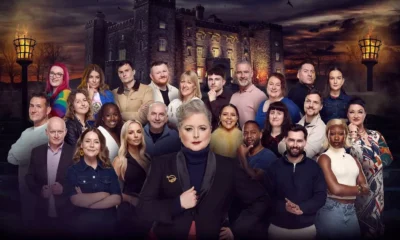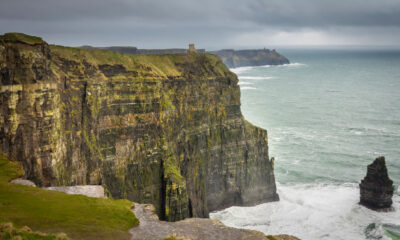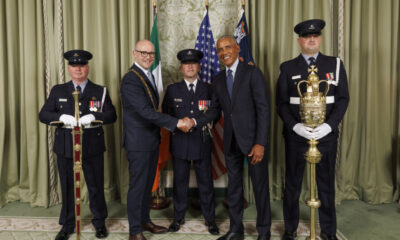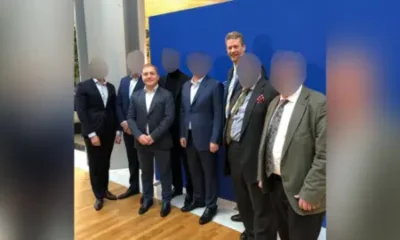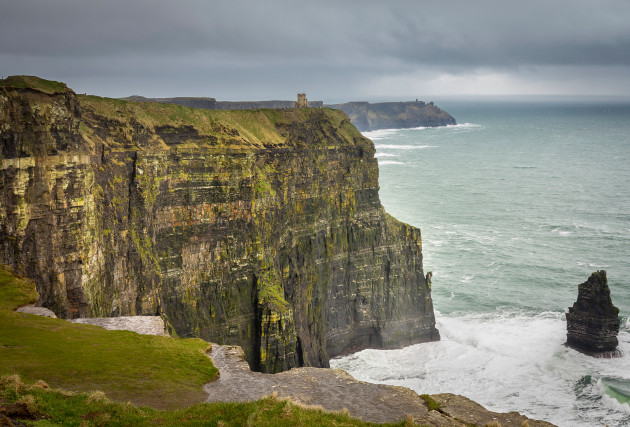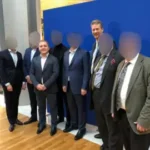Other News
Classical music is winning a new generation in Germany
Read more on post.
When Juri de Marco lifts his hand and plays a note on his small pocket trumpet, people start singing and making music — in concert halls and on the street. There’s no sheet music necessary; following his hand gestures allow people find their way to a shared sound that’s all their own.
What de Marco makes is known as community music. “In high-classical music culture, it’s all about perfection, interpretation and fidelity to the score,” de Marco tells DW.
For him, community music means “making music on an equal footing,” where the social interaction between people of different ages and cultures plays as important a role as the music itself.
Music-making on the rise in Germany
De Marco has tapped into the zeitgeist. According to a study by information and documentation body the Deutsches Musikinformationszentrum, more and more people in Germany are taking up music and singing on an amateur level — even without formal lessons. Over the past four years, the number has grown by 2 million, reaching 16.3 million people.
“Especially in ages up to 15 years, almost half of all children are making music,” said Antje Valentin, secretary general of the German Music Council, an umbrella organization for music culture.
Children who are introduced to music early become tomorrow’s concertgoers. At the moment, classical music presenters are focusing on reaching young audiences in particular. Special programs and new concert formats are being designed to spark curiosity among groups who might otherwise never set foot in a concert hall.
What tends to resonate is music that moves people, surprises them or fills them with wonder.
The Aurora Orchestra in London, for example, performs entire symphonies from memory. De Marco’s pocket trumpet piques people’s curiosity.
The duo Synaptic, made up of pianist Adele Thoma and singer Theresa Szorek, addresses psychological states of mind in the style of a live podcast. They combine Franz Schubert’s melancholic “Winterreise” song cycle with spoken texts and new music by Bernhard Lang, creating a staged evening of song.
“We’re interested in how society deals with psychological strain, the way it’s also experienced by the protagonist in ‘Winterreise,'” Thoma said. The program is structured like a live podcast in which the audience can follow a person’s suffering with a mix of curiosity and voyeurism.
Many musicians are striving to carve out niches in the concert market with unique programs. Pianist Danae Dörken and vibraphonist Pascal Schumacher recently released a new album featuring piano and vibraphone, with the driving rhythmic patterns of composer Philip Glass.
The vibraphone’s ethereal tones are especially captivating for audiences. “For me, as a classical pianist, this was a completely new world,” Dörken told DW at the Beethovenfest Bonn. Luxembourger Pascal Schumacher comes from the world of jazz. “It’s very unusual to work with the vibraphone,” Schumacher said. “You have to reinvent yourself time and again.”
What can classical music be combined with?
Valentin, of the German Music Council, sees enormous potential in concerts with innovative formats — especially when they involve blending classical music with sounds from other cultures. “I see tremendous development with transcultural ensembles,” Valentin said, “especially when combined with classical music.”
One example is Bernhard Schimpelsberger, who learned rhythms and melodies from a guru in India. He brings percussion instruments from around the world into classical concerts. In South Africa, he met cellist Abel Selaocoe.
“Abel plays Bach and sings African hymns over it,” Schimpelsberger said. “It’s incredible.” They have performed together for years as a duo.
Selaocoe has written an orchestral work that combines classical and South African music, with Schimpelsberger on percussion. For the past two years, they’ve been performing it around the world. “We play it constantly with new orchestras everywhere,” Schimpelsberger said, “and that’s how I made my way into the classical world myself.”
Social media and ‘real-life encounters’
De Marco has also traveled the world collecting music from different cultures for a project about Beethoven. At the Beethovenfest in Bonn, he founded a neighborhood choir. He’s now working on a video for social media about the group.
Today, it’s nearly impossible to gain attention without a presence on social platforms. Young British organist and influencer Anna Lapwood is a prime example: She has more than 2 million followers across her social media channels.
Of course, that requires constant attention and fresh content, the vibraphonist Schumacher said, “but the advantage is that you can reach a specific audience fairly easily and quickly.”
De Marco said it was not followers or clicks that mattered most. His videos are always intended to lead to real-life encounters.
“Especially when you make music across cultures, a sense of understanding for another culture develops very quickly,” he said. In today’s world, that can be an important contribution to mutual acceptance.
This article was translated from German.
Other News
The Traitors Ireland finale pulls in huge ratings as RTE bosses pay tribute
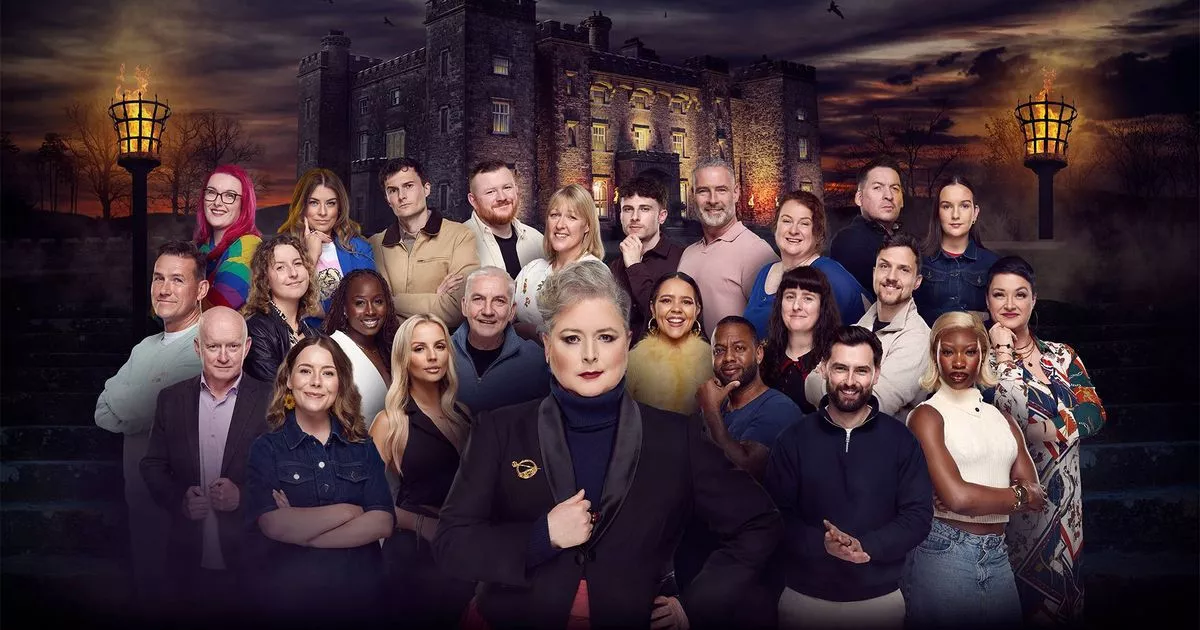
Read more on post.
RTE bosses have vowed to “build on our offering” as huge ratings figures for The Traitors Ireland have been released.
Across broadcast and streaming, The Traitors Ireland and companion show The Traitors Ireland Uncloaked have together reached over 2.1 million people on television to date, with the series generating over 4 million streams to date on RTÉ Player. Each episode of The Traitors Ireland drew an average audience of 557,000. The finale of The Traitors Ireland pulled in 732,000 viewers.
Commissioning Editor Gráinne McAleer said: “We are thrilled that each episode of The Traitors Ireland was viewed by so many across linear TV and on the RTÉ Player. We were particularly delighted with the number of 15 -34 year olds who tuned in and with the volume of viewers who also wanted to catch up and hear more on The Traitors Ireland Uncloaked.
“The series was brilliantly produced by Kite Entertainment and the collaboration between Kite and RTÉ really paid off, reminding viewers that our remit is to entertain as well as inform. The Traitors Ireland would have been nothing without our brilliant Players who threw themselves completely into the game and distracted and entertained the country for the month of September.
“There was someone for everyone in the cast and we’re really proud of the fact that the audience responded whole-heartedly to that.” Managing Editor Seán Mac Giolla Phádraig said, “The Traitors Ireland is a series that everyone involved can be very proud of. We’ve been particularly delighted to see the strength of talent across the different disciplines that worked for Kite Entertainment to produce the series. It really is a world class production.
“We’ve also been really pleased to see the passion for and dedication to the series from teams across RTÉ from the Oliver Callan show on RTÉ Radio 1 to the team in RTÉ sales; and from promotions, marketing, social media and communications to technology who all worked really hard to bring our audiences the best possible The Traitors Ireland experience.
“We ‘re also delighted at the response of audiences to The Traitors Ireland Uncloaked, a co-production between Kite Entertainment and the RTÉ Lab. Both series have set a new benchmark for collaboration between companies in the independent sector and RTÉ and we’re really excited about the potential in this as we continue to build on our offering to our audiences.”
Join our Dublin Live breaking news service on WhatsApp. Click this link to receive your daily dose of Dublin Live content. We also treat our community members to special offers, promotions, and adverts from us and our partners. If you don’t like our community, you can check out any time you like. If you’re curious, you can read our Privacy Notice.
For all the latest news from Dublin and surrounding areas visit our homepage.
Other News
Slovakia’s parliament changes constitution to recognise only two sexes, sparking anger
Read more on post.

ADVERTISEMENT
Slovakia’s parliament passed an amendment to the constitution on Friday that recognises only two sexes, along with other measures that critics say might breach the country’s international obligations and undermine the protection of human rights.
The amendment, which was drafted by Prime Minister Robert Fico’s government, required a three-fifths majority.
It passed with 90 votes in the 150-seat National Council, with 12 lawmakers from the conservative opposition helping the ruling coalition win the vote.
The amended constitution now recognises only two sexes, male and female, and states that Slovakia retains sovereignty in matters of “national identity,” which is not specifically defined, especially in “fundamental cultural-ethical questions.”
The amendment also makes it almost impossible for anyone other than married couples to adopt children.
The constitution had already defined marriage as “a unique union between a man and a woman.”
Parental consent is now needed for access to sexual education and equal pay for men and women is guaranteed.
Justice Minister Boris Susko told parliament that the amendment should boost traditional values.
International condemnation
Amnesty International condemned the move.
“Today, the Slovak government chose to follow the lead of countries, such as Hungary, whose policies have led to an erosion of human rights,” it said in a statement.
Council of Europe Commissioner for Human Rights Michael O’Flaherty previously urged lawmakers not to give a green light to the changes.
He said they deny “the realities of trans and intersex people and may impact on human rights guarantees such as access to legal gender recognition.”
“Seeking to disapply specific rights because they touch upon ‘national identity’ would be fundamentally incompatible with the Slovak Republic’s international obligations,” he added.
Fico has long been a divisive figure, both at home and across Europe.
His critics claim that under his rule Slovakia has abandoned its pro-Western course and is tilted more towards Moscow, in a similar vein to Hungary under Prime Minister Viktor Orbán.
Thousands of people have repeatedly rallied across Slovakia to protest Fico’s perceived pro-Russian stance and other policies.
Fico has refused to fall in with the rest of the EU in slapping sanctions on Russia in response to its full-scale invasion of Ukraine and has said Ukraine will not be invited to join NATO.
Additional sources • AP
Other News
Student, 20, died after slipping at the Cliffs of Moher in 2024
-
Politics3 days ago
European Parliament snubs Orbán with vote to shield Italian MEP from Hungarian arrest
-
Culture3 weeks ago
Life, loss, fame & family – the IFI Documentary Festival in focus
-
Health4 days ago
EU renews support for WHO’s Universal Health Coverage Partnership
-
Culture2 months ago
Fatal, flashy and indecent – the movies of Adrian Lyne revisited
-
Environment7 days ago
Key oceans treaty crosses threshold to come into force
-
Culture4 days ago
Twilight at 20: the many afterlives of Stephenie Meyer’s vampires
-
Culture1 week ago
Farewell, Sundance – how Robert Redford changed cinema forever
-
Culture4 weeks ago
What is KPop Demon Hunters, and why is everyone talking about it?




